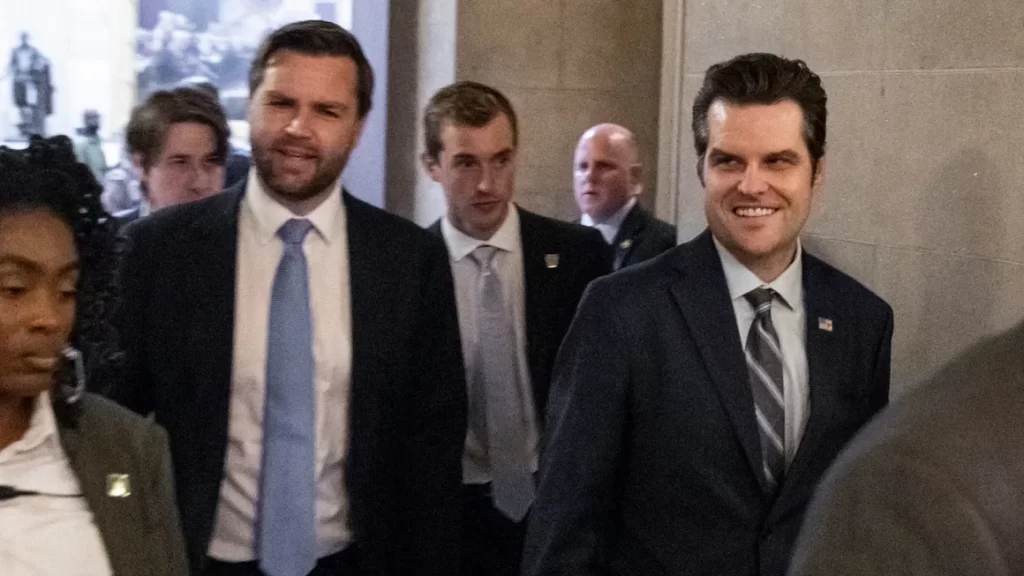Vance debuts new role as Trump’s point person on Capitol Hill
4 min read
Vice President-elect JD Vance and former Rep. Matt Gaetz walk from a meeting with Republican senators on November 20, 2024. Mattie Neretin/CNP/Sipa USA

Vice President-elect JD Vance and former Rep. Matt Gaetz walk from a meeting with Republican senators on November 20, 2024. Mattie Neretin/CNP/Sipa USA
JD Vance, Ohio’s first-term senator, has stepped into a crucial new role as Donald Trump’s point person on Capitol Hill, a position that will test his political influence and effectiveness as the president-elect’s second-in-command. In the weeks following his election victory, Vance had kept a low profile, but this week marked his reemergence as a key figure in Trump’s transition. His task: to ensure that Trump’s policies are smoothly implemented by rallying support among lawmakers and securing approval for the president-elect’s controversial Cabinet choices.
One of Vance’s first assignments was to shore up support for two of Trump’s most contentious Cabinet picks, both of whom face allegations of sexual misconduct. On Wednesday, Vance brought former Florida Rep. Matt Gaetz, Trump’s nominee for attorney general, to Capitol Hill to meet with key senators involved in his confirmation. The next day, Vance repeated the process for former Fox News host Pete Hegseth, Trump’s pick for the Department of Defense. These efforts are seen as early tests of Vance’s influence in Washington, particularly given that he has only been in the Senate for a short time. His ability to secure confirmations will be seen as a gauge of his political skill.
Vance’s limited tenure in Washington has led some Congressional Republicans to question his established connections on Capitol Hill. North Dakota Sen. Kevin Cramer acknowledged that Vance lacks long-term relationships with lawmakers, but pointed out that their shared political goals foster a natural kinship. “He doesn’t have long relationships, but we all like people who have done what we’ve done,” said Cramer, adding that the Trump team, including Vance, will work in tandem to win over key senators. Vance’s ability to rally support for Trump’s Cabinet nominees will rely on his capacity to navigate these relationships, even without deep-rooted connections.
Vance has already made his intentions clear by taking to social media to remind Republican senators that Trump’s victory has granted him a mandate. “Donald J. Trump just won a major electoral victory,” Vance wrote on X (formerly Twitter), “He deserves a cabinet that is loyal to the agenda he was elected to implement.” His public messages serve as a reminder to lawmakers who will vote on Trump’s nominees and show that Vance is ready to assert Trump’s priorities in Congress.
During this transition period, Vance has also dealt with online criticism of his absence during a key Senate vote. He was called out by Grace Chong, a staffer for Steve Bannon’s podcast, who urged GOP senators to “do your fricking job.” Vance responded by calling her a “mouth-breathing imbecile,” though both deleted their posts afterward. Vance explained his absence by stating that with the Democrats holding a Senate majority, his vote was unlikely to change the outcome. Instead, he was focused on meeting with Trump and other potential nominees for key positions in the new administration.
Vance’s close involvement in Trump’s transition, especially in selecting key Cabinet members, marks a significant part of his role. He has been working with Trump’s inner circle at Mar-a-Lago, meeting daily with the president-elect to discuss major appointments, including the potential nomination of former ICE director Tom Homan as a “border czar.” Vance’s connection with Trump’s circle, which includes figures like Elon Musk and Donald Trump Jr., has been built over years and played a part in his swift rise to prominence within Trump’s political orbit.
Despite his focus on transition-related meetings, Vance’s media presence has significantly diminished since Election Day, leaving some to wonder whether he will return to TV as a key surrogate for Trump once the transition slows down. Vance’s political allies note that his role will become more prominent as Inauguration Day approaches, with his defense of Trump’s agenda on television likely to become a staple of his public persona.
While the specifics of his future portfolio remain unclear, Vance has expressed his strong interest in certain policy areas, particularly immigration, technology, and the economy. As vice president-elect, Vance is expected to play an influential role in shaping Trump’s legislative agenda, particularly in working with Capitol Hill to push through the president-elect’s priorities. His deputy chief of staff, James Braid, has been appointed to lead legislative affairs in the White House, a move that will help Vance coordinate his efforts with Congress.
Vance’s role in pushing Trump’s policies through Capitol Hill will be pivotal, particularly as the new administration begins to take shape. Trump’s legislative agenda is expected to focus on fulfilling promises made to voters, and Vance will play an integral part in ensuring that these priorities are executed in Washington. As the vice president-elect, Vance will be a key figure in Trump’s broader strategy, working alongside others to navigate the complexities of the legislative process and ensure the success of the president-elect’s second term.